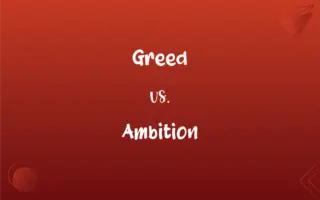Cycle vs. Bicycle: What's the Difference?
Edited by Aimie Carlson || By Janet White || Published on January 31, 2024
A cycle refers broadly to any process or series of events that repeat, while a bicycle is a specific type of vehicle with two wheels powered by pedaling.

Key Differences
A cycle encompasses a wide range of repetitive sequences or processes in various contexts, such as nature, science, or even economics. A bicycle, in contrast, specifically refers to a human-powered, pedal-driven vehicle with two wheels attached to a frame.
The term 'cycle' is versatile, used in phrases like 'water cycle' or 'business cycle', denoting a series of events that recur regularly. 'Bicycle' is exclusively used to describe a two-wheeled vehicle, often used for transportation or recreation.
'Cycle' can function as both a noun and a verb, such as in "life cycles" (noun) or "cycling through stages" (verb). 'Bicycle', primarily a noun, also forms verbs like 'bicycling' or 'bicycled', specifically related to riding the bicycle.
The bicycle is a tangible object, a form of conveyance with physical components like handlebars, wheels, and pedals. A cycle can be intangible, representing abstract concepts or natural phenomena without physical manifestation.
The term 'cycle' has ancient roots in language, derived from the Greek 'kyklos', meaning circle. 'Bicycle' originated in the 19th century, combining the prefix 'bi-' (two) with 'cycle', denoting its two-wheeled nature.
ADVERTISEMENT
Comparison Chart
Meaning
Repetitive series or process
Two-wheeled pedal-driven vehicle
Contextual Use
Broad, various fields
Specific, transportation
Linguistic Function
Noun and verb
Primarily a noun
Nature
Can be intangible
Tangible object
Historical Origin
Ancient Greek origin
19th century, specific to vehicle
ADVERTISEMENT
Cycle and Bicycle Definitions
Cycle
A cycle is a series of events that repeat in a regular sequence.
The water cycle demonstrates nature's way of recycling water.
Bicycle
A bicycle is a two-wheeled vehicle propelled by pedals.
Riding a bicycle is a popular form of exercise and transportation.
Cycle
In biology, a cycle refers to a series of stages in a process of development.
The life cycle of a butterfly is a fascinating transformation.
Bicycle
It's a sustainable mode of transport, powered by human effort.
I commute to work on my bicycle to reduce my carbon footprint.
Cycle
A cycle can also mean a complete set or series of related events.
History often moves in cycles, repeating certain patterns.
Bicycle
The design of bicycles has evolved over time, including variations like mountain bikes and road bikes.
He prefers a mountain bicycle for off-road trails.
Cycle
In economics, a cycle is a period of fluctuation in business activity.
The business cycle affects industries differently.
Bicycle
A bicycle is designed for one rider, typically with a saddle, handlebars, and gears.
She adjusted the gears on her bicycle before starting her ride.
Cycle
In a broader sense, cycle signifies any circular or rotational movement.
The planets move in a cycle around the sun.
Bicycle
Bicycles are used for recreation, sport, and commuting.
The bicycle race drew competitors from around the world.
Cycle
An interval of time during which a characteristic, often regularly repeated event or sequence of events occurs
Sunspots increase and decrease in intensity in an 11-year cycle.
Bicycle
A vehicle consisting of a light frame mounted on two typically wire-spoked wheels one behind the other and usually having a seat, handlebars for steering, brakes, and two pedals by which it is driven.
Cycle
A single complete execution of a periodically repeated phenomenon
A year constitutes a cycle of the seasons.
Bicycle
An exercise bicycle.
Bicycle
To ride or travel on a bicycle.
FAQs
Is a bicycle only used for transportation?
No, it's also used for recreation and sports.
Can the word cycle be used in different fields?
Yes, it's used across various fields like biology, economics, and more.
What's an example of a cycle in nature?
The water cycle, involving evaporation and precipitation, is a natural example.
How has the bicycle evolved over time?
Bicycles have evolved in design, with variations like electric bikes and racing bikes.
What does bicycle mean?
A bicycle is a two-wheeled vehicle driven by pedals.
What is a cycle?
A cycle refers to any series of events that repeat regularly.
Are bicycles environmentally friendly?
Yes, they are sustainable and reduce carbon emissions.
Can cycle refer to a physical object?
Not usually, it typically refers to processes or series of events.
How do bicycles impact urban planning?
Bicycles influence the development of bike lanes and sustainable city designs.
What is the significance of cycles in economics?
Economic cycles represent the expansion and contraction phases of an economy.
How long have bicycles been around?
Bicycles have been in use since the early 19th century.
Can cycles be broken or altered?
Yes, cycles can be disrupted or changed by external factors.
Do cycles always follow the same pattern?
Not necessarily; some cycles can vary in duration and intensity.
Is cycling a popular sport?
Yes, cycling is a widely popular sport globally.
Can the term cycle apply to personal experiences?
Yes, it can describe recurring phases in personal life.
Are bicycles safe for road use?
With proper safety gear and regulations, they can be safe for road use.
Is bicycling beneficial for health?
Yes, it's good for cardiovascular fitness and overall health.
What types of bicycles are there for different terrains?
There are mountain bikes, road bikes, and hybrid bikes for various terrains.
What is a business cycle?
It's a cycle showing the rise and fall of economic activity over time.
Do all bicycles have gears?
Not all; some are single-speed, while others have multiple gears.
About Author
Written by
Janet WhiteJanet White has been an esteemed writer and blogger for Difference Wiki. Holding a Master's degree in Science and Medical Journalism from the prestigious Boston University, she has consistently demonstrated her expertise and passion for her field. When she's not immersed in her work, Janet relishes her time exercising, delving into a good book, and cherishing moments with friends and family.
Edited by
Aimie CarlsonAimie Carlson, holding a master's degree in English literature, is a fervent English language enthusiast. She lends her writing talents to Difference Wiki, a prominent website that specializes in comparisons, offering readers insightful analyses that both captivate and inform.






































































